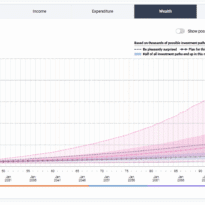This week’s investment soundbite from Fund Calibre is with Abby Glennie, manager of the abrdn UK Mid Cap Equity fund. Abby talks about why UK mid cap stocks can offer investors the best of both worlds: more excitement than their larger peers in the FTSE 100 but without many of the risks associated with the UK’s smallest names.
(Pre-recorded 27 March 2023.)
Tell us a little bit about the UK’s mid cap index, the FTSE 250 – the difference between that and the FTSE 100, and the types of companies that are in that mid cap index.
I think everyone’s pretty aware of the FTSE 100, of how large percentages are in what I would call slightly ‘older economy’sectors, whereas the FTSE 250 mid cap space is much more dynamic, much more sector diverse, and you have got more growth dynamics running through the whole space.
We think the AIM index is quite important as well. AIM has massively improved over the past 10 or 15 years in terms of quality of business and governance. These are profitable, dividend-paying, strong businesses, and a lot of them are actually in the market cap space or the equivalent to FTSE 250 [firms]. So, for instance, in our mid cap fund, we would sustainably have 25-30% invested in the AIM index.
Around 75% or thereabouts of the FTSE 100’s earnings come from overseas. What’s the approximate equivalent ratio for the FTSE 250?
Mid cap is basically 50 / 50, maybe even slightly above that. I think one thing that people almost don’t think about sometimes,is you are taking an inherent FX bet in the FTSE 100 that you maybe don’t think you’re taking. Whereas in the mid cap space, through a cycle, you are really taking more of a bet on the actual company underlying fundamentals.
Can you give us an investment case for the mid cap space?
I think they offer a lot of the things that people like more about the small cap space. They offer a lot of the growth dynamics that a lot of investors are looking for, particularly if you’re taking a longer-term approach.
One of the things we like about these businesses, is where they can expand into adjacencies. That might be a new division, a new product, or a new geography. And actually, within that mid-cap space, when you’re taking that decision, it’s big enough often that it impacts the whole business – you can shift around the business and really grow dynamically, which we really like.
We also like the fact that, due to the diversity of the FTSE 250, it gives a lot of the growth opportunities but with a lower risk dynamic. Also, mid cap liquidity is pretty good if you’re willing to invest in businesses for the medium term.
One further point is that the UK mid cap space has, over the last 20 years, generated twice the return of large caps, and,actually, has generated better returns than the S&P 500 and the MSCI ACWI. So, I think people forget actually what a good return universe UK mid cap has been.
Additionally, from an index level, these companies are generally less well covered than large cap businesses, in terms of the number of sell-side analysts looking at them. There’s more information asymmetry and opportunity to really add value, particularly for an active fund manager, so the opportunity in mid cap is really quite attractive.
Another part of your style of investing is to ‘run your winners’. Could you give us an example of a stock that you bought, that was quite small and that is now larger?
There are some companies that we’ve consistently held strong positions in. For instance, Midwich [Group plc], which is a value-add reseller in audio-visual equipment, which is increasingly diversified in terms of geography. Another example is Hollywood Bowl [Group Plc] which we’ve held pretty consistently, which is a ten-pin bowling operator. Another company is Gamma Communications [PLC]. And actually, all of these companies we would have bought as IPOs, but perhaps would have been in our small cap fund originally when they first listed. Now, they’re pretty sizeable mid cap names.
There are other companies where, because of portfolio construction and because of how our process works, we’ve come in and out of these businesses or position sizes have changed significantly over years. So, companies such as Telecom Plus [PLC], which we’ve probably owned for maybe 15 years in some form, but not owned at all times. CVS [Group PLC], the pet veterinary business as well which we had exited after we thought the investment case didn’t really fit our process anymore, and then I think we bought that back in 2021. Greggs [PLC] is another good example. The investment case has come and gone during different periods, and I think that’s where our process allows us to believe in some of these stocks for the long term, but also gives us a really good judgment of when we should step away from that, for periods of time.
Your investment process has something called the Matrix as part of its process. Can you describe what it is that the Matrix does and how that helps you to pick and potentially avoid stocks as well?
The Matrix is essentially a stock-screening tool which has been developed in-house. The two main ways we use the Matrix is for stock screening and also for portfolio construction. For our whole investable universe, we can look at what is the Matrix telling us about that stock and it will give us a numerical score. We can also look at what all the factors individually are saying.We are constantly checking, using live data. We’re looking at what stocks are screening well: should we be paying more attention? Should we be doing the fundamental research? Although it’s only a stage in our process, it is quite an important one.
We also are constantly challenging ourselves on the existing portfolios, looking at which stocks are not scoring well, challenging ourselves in terms of part of our sell discipline. This is an industry where, particularly if you’re a long-term shareholder, you can become quite emotionally attached to businesses, and actually the Matrix has no emotional attachments to stocks. So, it is really good at making you think neutrally in that way, and also creating team challenge and debate.
What’s quite interesting in periods like we’re seeing at the moment – and we’ve had a lot of these discussions with clients – is that our processes don’t change through a cycle, but what is flexible is what is screening as quality growth momentum. And this is where the Matrix helps you to stay aware of where companies or sectors which might not have been your most traditional stocks – maybe you’ve never held them before, maybe they’re in a sector you don’t typically own that much of – actually, those are becoming quality growth momentum, in what is maybe a different economic environment.
Can you give us an example of your biggest stocks and what some of their growth characteristics are?
One that we’ve held for quite a while, and which is still one of the biggest stocks in the portfolio, would be Keywords Studio[PLC]. It is essentially the global leader in outsourced services for video game companies. Their typical customers are all thebig, triple-A games developers, as well as maybe some smaller, indie-type developers. And what I’ve seen with this business is,that it has really expanded into adjacencies that I mentioned before. This business is truly global in nature, but what I’ve also seen them do is – ever since I first invested in this, which would’ve been maybe 2017 probably – I’ve seen them really invest in terms of the number of different services that they offer. They can help with games development, artwork, they can help with customer support, all sorts of dynamics. And what’s important about that, is the cross-selling opportunity that they have within these big customers.
It’s a business which is very driven by organic growth, but also does complementary acquisitions. And for us, that’s really important, because we don’t mind businesses which are acquisitive in nature to some degree, but we really always want to see that supported by organic growth so, you’re not just buying growth. Also, the type of acquisitions that Keywords do we really like, because they’re either [for] very clear skillsets or they’re about acquiring people – it’s a difficult industry to grow people because it’s actually quite competitive in nature, and a lot of these companies – particularly on the games development side – they like to work almost as an independent. And Keywords becomes a really good home for them because I think there’s a really strong culture, but they also let the studio’s nature of parts of the business really drive their own culture and retain that. I think they’ve got a really good balance in that, and management have shown they can execute on that strongly. So, that’s a really high return business, good margins, really sensible about their balance sheet leverage as well. And also it’s in a growth industry.
You can listen to the full interview here.
[Main image: pawel-czerwinski-eybM9n4yrpE-unsplash]
































